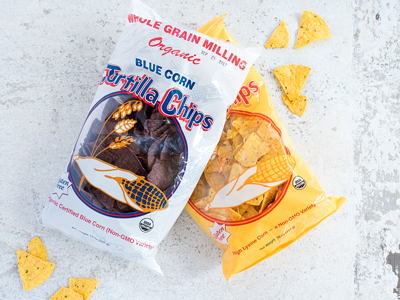 Whole Grain Milling Co.
Whole Grain Milling Co.
Welcome, Minnesota
Back then he was farming organically, though nobody called it that, and the USDA didn’t provide certification. Later, in the 1970s, when everyone started using hybrid seeds and adding chemicals to their crops, he joined in like the rest. But he soon started to have his doubts. His livestock started having more health problems than they’d ever had before. Even as Doug began to take over, his father voiced his concerns that they were headed in the wrong direction. When he passed away from cancer not long after, it made Doug and Lin think seriously about the future of the farm.
It was their main impetus to becoming certified organic in 1989. Certainly, it wasn’t about demand. At that time, there were few markets for organic crops. They were able to sell soybeans for food grade tofu, but their corn and oats got mixed in with GMO crops on the conventional markets and it was hard to make much of a living. They needed a way to add value to their products without compromising the integrity of their agricultural practices. “If we couldn’t farm organically, we would close up shop,” says Lin. “We care about the health of the food we eat and produce. We wouldn’t want to do it any other way.”
The solution came in what happened to the crops after they’d been harvested; there weren’t processing facilities nearby to handle organic, so instead, the Hilgendorfs built one of their own. In 1990 they finished construction on a mill, and started Whole Grain Milling Co. Their goal was to provide just enough processing to put their grains into a more usable form while keeping as much of the nutrition and quality in the grains intact. To do that, they had to get creative with their equipment. Some of it is quite old-because that was what was available. Some of it was custom-built, and some of it, like the buckwheat hauler, was invented from scratch, by their son Jeff. “I can’t tell you how it works,” says Lin, laughing. “Because he won’t tell me. It’s a big family secret.” Jeff and his brother Ross soon joined the operation full-time, and with them came their families.
Today, because of their custom-built facilities, the Hilgendorfs are able to grow and mill a diverse array of grain crops: oats, buckwheat, spelt, rye, barley, soybeans, yellow and white popcorn, among others. They offer everything from garbanzo to millet flour to whole wheat bread and pancake mixes. Anything they don’t grow, they source from other growers in the Midwest. But there’s one thing they grow that you can’t find anywhere else in the world: high-lysine corn.
The crop is a hybrid that was developed through a breeding program at Purdue University to improve protein levels in corn: high lysine corn is unusually high in two essential amino acids-lysine and tryptophan. This means the corn variety has nearly double the effective protein content of normal corn, almost as much as meat and more than milk.
High-lysine corn was originally sold by Crow’s Seed Company, which is how the Hilgendorfs got their hands on it. But then the family based company ran out of family to run it, and they were bought out by Monsanto. The agricultural behemoth tried to create a GMO version of the high-lysine corn, but had to pull it from the market because it was too toxic. So the seed line became discontinued, allowed to die out. But the Hilgendorfs had bought enough seed before the supply dried up to continue growing it while they hired a corn breeder to figure out how to get the inbreds to produce new seeds. He figured it out in the nick of time says Lin, “It just worked out that we found someone to do it before we ran out.”
Most of the Hilgendorf’s high lysine corn goes into their delicious, whole-grain tortilla chips that are a perennial Wedge staff and customer favorite. Up until recently, they had been using a contracted supplier, but they kept running out and sometimes orders would get backed up by almost three months. Once again, the Hilgendorfs took matters into their own hands, building a state-of-the-art production facility a few miles from their farm. The Wedge grocery staff got a chance to visit the new building over the summer and were given a tour of the operations by the Hilgendorfs, who are very happy to be up and running again.
“We are so appreciative of our customers who were patient with us when we had trouble with our chip supply,” says Lin. “People wrote notes and emails and even made phone calls. It’s such a supportive community, and we’re so grateful for it.”
